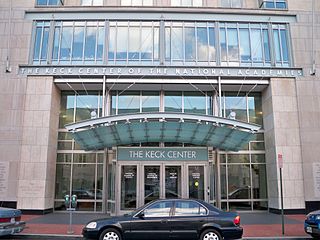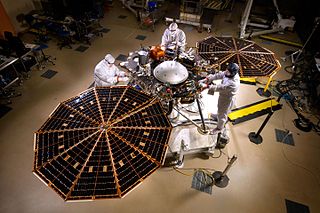
The National Academies of Sciences, Engineering, and Medicine is the collective scientific national academy of the United States. The name is used interchangeably in two senses: (1) as an umbrella term for its three quasi-independent honorific member organizations. And (2) as the brand for studies and reports issued by the operating arm of the three academies, the National Research Council (NRC). The NRC was first formed in 1916 as an activity of the NAS. Now jointly governed by all three academies, it produces some 200 publications annually which are published by the National Academies Press.

The Cabinet of Australia is the Australian Government's council of senior ministers of the Crown, responsible to Parliament. Ministers are appointed by the Governor-General, on the advice of the Prime Minister, who serve at the former's pleasure. Cabinet meetings are strictly private and occur once a week where vital issues are discussed and policy formulated. The Cabinet is also composed of a number of Cabinet committees focused on governance and specific policy issues. Outside the Cabinet there is an Outer Ministry and also a number of Assistant Ministers, responsible for a specific policy area and reporting directly to a senior Cabinet minister of their portfolio. The Cabinet, the Outer Ministry, and the Assistant Ministers collectively form the full Commonwealth Ministry of the government of the day.

The Natural Sciences and Engineering Research Council of Canada is the largest funder of scientific research in Canada. NSERC promotes scientific discovery by funding university professors and students and fosters innovation by encouraging Canadian companies to participate and invest in postsecondary research and training. With funding from the Government of Canada, NSERC supports the world-class research of over 41,000 talented students and professors at universities and colleges across the country with an annual budget of $1.1 billion.

The Royal Academy of Engineering (RAEng) is the UK's national academy of engineering.

Raghunath Anant Mashelkar, also known as Ramesh Mashelkar, is an Indian chemical engineer and a former Director General of the Council of Scientific and Industrial Research (CSIR). He was also the President of Indian National Science Academy (2004-2006), President of Institution of Chemical Engineers (2007) as also the President of Global Research Alliance. He was also the first Chairperson of Academy of Scientific and Innovative Research (AcSIR). He is a Fellow of the Royal Society, Fellow of the Royal Academy of Engineering (FREng), Foreign Fellow of US National Academy of Engineering and Foreign Associate of National Academy of Science (USA)
Calestous Juma FRS HonFREng was an internationally recognised authority in the application of science and technology to sustainable development worldwide. He was named one of the most influential 100 Africans in 2012, 2013 and 2014 by the New African magazine. He was Professor of the Practice of International Development and Faculty Chair of the Innovation for Economic Development Executive Program at Harvard Kennedy School. Juma was Director of the School's Science, Technology and Globalization Project at Harvard Kennedy School as well as the Agricultural Innovation in Africa Project funded by the Bill and Melinda Gates Foundation. His latest book, Innovation and Its Enemies: Why People Resist New Technologies. was published by Oxford University Press in 2016.

The National Science Board (NSB) of the United States establishes the policies of the National Science Foundation (NSF) within the framework of applicable national policies set forth by the President and the Congress. The NSB also serves as an independent policy advisory body to the President and Congress on science and engineering research and education issues. The Board has a statutory obligation to "...render to the President and to the Congress reports on specific, individual policy matters related to science and engineering and education in science engineering, as Congress or the President determines the need for such reports,". All Board members are presidential appointees. NSF's director serves as an ex officio 25th member and is appointed by the President and confirmed by the US Senate.
The Academy of the Social Sciences in Australia (ASSA) is an autonomous, non-governmental organisation devoted to the advancement of knowledge and research in the social sciences.
The Department of Industry, Innovation, Climate Change, Science, Research and Tertiary Education (DIICSRTE) was a department of the Australian Government charged with further developing growth in Australian industries and advancements in science and research.
The National Academy of Engineering (NAE) is an American nonprofit, non-governmental organization. The National Academy of Engineering is part of the National Academies of Sciences, Engineering, and Medicine, along with the National Academy of Sciences (NAS), the National Academy of Medicine, and the National Research Council.

Research Councils UK, sometimes known as RCUK, was a non-departmental public body which coordinated science policy in the United Kingdom. It was an umbrella organisation that coordinated the seven separate Research Councils that are responsible for funding and coordinating academic research for the arts, humanities, science and engineering. The strategic partnership of the UK's seven Research Councils, Research Councils UK has now transitioned into UK Research and Innovation (UKRI).
The Office of the Chief Scientist (OCS) is part of the Department of Industry, Innovation and Science. Its primary responsibilities are to enable growth and productivity for globally competitive industries. To help realise this vision, the Department has four key objectives: supporting science and commercialisation, growing business investment and improving business capability, streamlining regulation and building a high performance organisation.
Research Quality Framework (RQF) was a component of Backing Australia's Ability, an initiative of the Australian Government to formulate a best practice framework for assessing research quality and the impact of research, and ensure that public funding was being invested in research which would deliver real benefits to the wider community. RQF was to bring public funding of research in line with government policy for funding to be determined by outcomes achieved.
Graeme Turner is an Australian professor of cultural studies and an Emeritus Professor at the University of Queensland. During his institutional academic career he was a Federation Fellow, a President of the Australian Academy of the Humanities, founding Director of the Centre for Critical and Cultural Studies at the University of Queensland, and Convenor of the ARC Cultural Research Network.

The Department for Innovation, Universities and Skills (DIUS) was a UK government department created on 28 June 2007 to take over some of the functions of the Department of Education and Skills and of the Department of Trade and Industry. Its head office was based at Kingsgate House, 66-74 Victoria Street, London SW1, which has now been demolished. In June 2009 it was merged into the newly formed Department for Business, Innovation and Skills. It was responsible for adult learning, some parts of further education, higher education, skills, science and innovation.
William James Peacock, is an Australian molecular biologist who was Chief Scientist of Australia (2006–2008), President of the Australian Academy of Science (2002–2006) and Chief of CSIRO Plant Industry (1978–2003).

The American Institute for Medical and Biological Engineering (AIMBE) is a non-profit organization headquartered in Washington, representing 50,000 individuals and the top 2% of medical and biomedical engineers.
The Australian Science, Technology and Engineering Council (ASTEC) was an Australian government agency. ASTEC was established in April 1977 as the Australian Science and Technology Council to advise the Australian government on matters relating to science and technology.

Megan Elizabeth Clark is an Australian geologist and business executive, former director of the CSIRO, and head of the Australian Space Agency.
Dr Ian Geoffrey Gould is a former Chancellor of the University of South Australia (2008–2015) and former Managing Director (Australia) of Rio Tinto Group. Gould is considered to be one of South Australia's most influential people.













